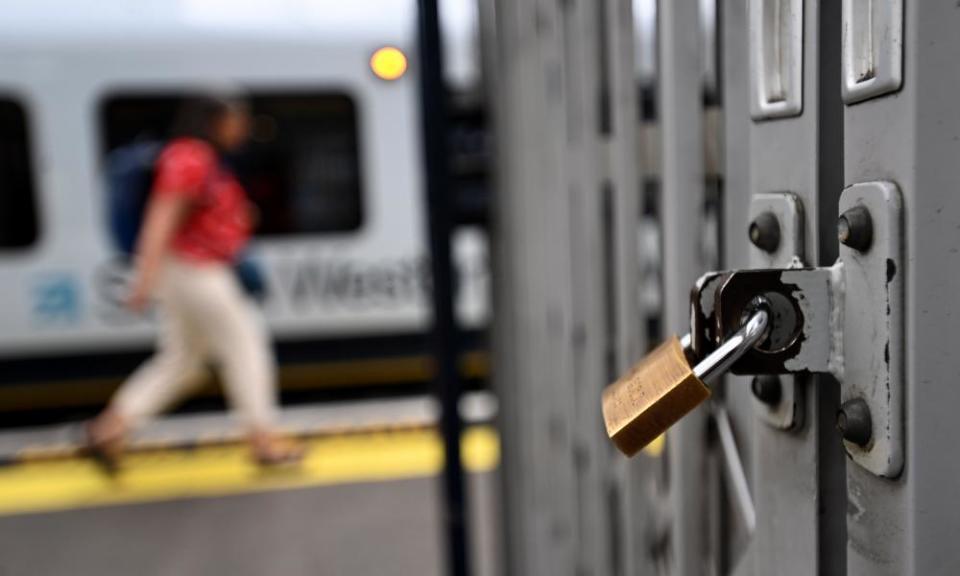UK faces biggest rail strike in 30 years

The biggest rail strikes in three decades are due to start on Monday night, with trains cancelled across Great Britain for much of the week.
The first of three 24-hour walkouts by 40,000 RMT members, including signallers, maintenance and train staff, will start just after midnight on Tuesday morning, with only one in five trains running on strike days and halting services altogether in much of northern and south-west England, Wales and Scotland.
The strikes, over pay and attempts to reform the rail industry with post-Covid work patterns hitting commuter revenues, will cause six days of disruption, with trains limited to one an hour between 7.30am and 6.30pm on major intercity and urban routes. Services will start later and be reduced on subsequent days.
Related: Britain’s rail strikes: which trains will be running where and when?
The action is being taken by Network Rail employees and onboard and station staff working for 13 train operators in England. The RMT said thousands of jobs were at risk in maintenance roles and that ticket office closures were planned, on top of pay freezes during a time of high inflation.
The walkout by signallers will have most impact, particularly in rural areas, leading to line closures in places such as Wales, where there is no direct dispute with the train operator. Most operators have told passengers to travel only if necessary on strike days. Northern Rail has advised passengers not to travel for the whole week.
While Conservatives have attempted to associate the union-backed Labour party with the strikes, Labour has pointed out that the transport secretary, Grant Shapps, and other ministers have refused to take part in talks.
Unions asked to meet ministers, saying the Treasury and Department for Transport control contracts and funding. Shapps said it was up to employers to negotiate, although train operating companies have been told they cannot offer pay rises, according to industry insiders and unions.
Shapps said on Sunday it was “crazy” to suggest that the Tories wanted rail unions to go on strike, after Labour accused the government of encouraging the walkouts to go ahead in order to stoke division. He said the strikes were “unnecessary” and a result of trade union leaders “gunning for” a fight, accusing the RMT of planning to “punish millions of innocent people”.
Last week, Shapps told rail staff they risked “striking yourself out of a job”. Network Rail bosses estimate the stoppages will cost the industry about £150m in lost revenue.
Talks have been ongoing between Network Rail and the RMT, but bosses admitted there was little hope of a breakthrough.
The walkouts are on 21, 23 and 25 June and a special timetable will be in operation from Monday, with some evening services curbed, until Sunday. About 20% of trains will run on mainlines and urban areas.
Adding to the commuter misery, a separate London Underground strike will also bring much of the capital’s transport to a halt on Tuesday. About 10,000 members of the RMT will walk out for 24 hours, closing most tube lines. London Overground and Elizabeth lines will also be affected by the national rail strike throughout the week.
Other unions may join the rail strike later in the summer, in a move that could halt services altogether. The TSSA union, which represents control room staff and managers who step in to run contingency signalling, is balloting members at Network Rail and announced strike votes at more train operators last week.

 Yahoo Finance
Yahoo Finance 